 R. A. Christmas has been presented with the Association for Mormon Letters Lifetime Achievement Award. A panel honoring him, featuring Robert Rees, Clifton Jolley, Tyler Chadwick, Bruce W. Jorgensen, Harlow Clark, and Dennis Clark, was held online on April 30, and is available on Youtube. Here is the award citation, written by Robert Rees and Clifton Jolley, as well as a biographical sketch of Christmas’ career.
R. A. Christmas has been presented with the Association for Mormon Letters Lifetime Achievement Award. A panel honoring him, featuring Robert Rees, Clifton Jolley, Tyler Chadwick, Bruce W. Jorgensen, Harlow Clark, and Dennis Clark, was held online on April 30, and is available on Youtube. Here is the award citation, written by Robert Rees and Clifton Jolley, as well as a biographical sketch of Christmas’ career.
Lifetime Achievement Award Citation
R. A. Christmas
Contemporary Mormon literature likely was not what Orson F. Whitney had in mind when he predicted in an 1888, “We will yet have Miltons and Shakespeares of our own. . . . [God’s] brightest spirits are held in reserve for the latter times. In God’s name and by his help we will build up a literature whose top shall touch heaven, though its foundations may now be low in earth.” While Mormon literature has not yet reached the Parnassian pinnacle Elder Whitney foresaw, the variety and richness of Mormon literature that flourishes in this early part of the twenty-first century certainly affirms the strength of its earthly foundation. That strength is reflected in the range and richness of Robert Christmas’s literary expressions over the past half century. By virtue of his poetry, fiction, criticism, and, most recently, musical drama, Robert Christmas has more than earned the 2020 Lifetime Achievement Award from the Association for Mormon Letters.
Bob is an accomplished poet with a distinctive Mormon voice. In fact, one might argue that his is the most consistently Mormon (as opposed to Latter-day Saint) voice of any of the poets of his generation. It is hard to think of a Christmas poem that isn’t in one way or another “Mormon.” He writes about Joseph Smith, Brigham Young, polygamist women, fundamentalists, and John D. Lee, among others, and about tithing, temples, sacrament meeting, missionary work, and just about every other Mormon subject one can think of. While keeping at least one eye on the Celestial Kingdom, Christmas’s personae seem to be most comfortable from the vantage point of the Telestial, which is, after all, a much richer vein for mining literature that speaks to real Latter-day Saints. As he says in “Ecclesiastical Correctness”:
The Mormon Church calls its members “Saints,”
and would settle for being called, “The Church
of Jesus Christ”—but that sounds too exclusive.
And as for “Saints”—face it, that’s a stretch.
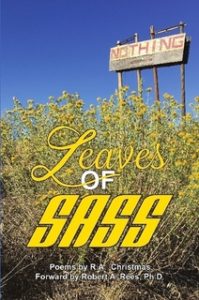 Bob’s most recent collection of poetry, Leaves of Sass, shows his characteristic poetic proficiency, wit, and comic irony. Like Walt Whitman, who sang his barbaric yawp over the cities, mountains and plains of America, Christmas’s yawp (which he denigrates by calling it a “chirp”), his song of himself, floats over the homes, chapels, and temple spires of the Mormon landscape. Robert Frost said he had “a lover’s quarrel with the world.” The same could be said of Bob’s relationship with the Church, although his quarrel is more like that of the English Metaphysical poets who tended to play hob with holy things — but always with a love and reverence of the holy. For example, in “Song of Himself,” Christmas responds to a promise from the temple ceremony about being anointed to become “a king and priest unto the Most High/God,” with “really?” only to follow it with
Bob’s most recent collection of poetry, Leaves of Sass, shows his characteristic poetic proficiency, wit, and comic irony. Like Walt Whitman, who sang his barbaric yawp over the cities, mountains and plains of America, Christmas’s yawp (which he denigrates by calling it a “chirp”), his song of himself, floats over the homes, chapels, and temple spires of the Mormon landscape. Robert Frost said he had “a lover’s quarrel with the world.” The same could be said of Bob’s relationship with the Church, although his quarrel is more like that of the English Metaphysical poets who tended to play hob with holy things — but always with a love and reverence of the holy. For example, in “Song of Himself,” Christmas responds to a promise from the temple ceremony about being anointed to become “a king and priest unto the Most High/God,” with “really?” only to follow it with
This is a promise worth repeating,
And worth printing – here, anywhere.
It’s almost too good to be true.
Bob’s poetry is both brilliant and brilliantly (and often shockingly) honest, especially when he writes obliquely about himself. He cops to vices major and minor and opens his personal story like the pages of the National Enquirer, although unlike traditional “confessional poets,” his “I” is a slightly distanced “he.” Hidden behind one of Christmas’s favorite personae, known as “Hank” (a kind of cowboy poet), is a skilled craftsman with degrees from Stanford, Berkeley, and USC.
Bob Christmas is also a gifted writer of fiction. Like his poems, his stories reveal a decidedly modern Mormon mind, one that struggles with temptation, sin, obedience, back-sliding, repentance, resolve to be better, etc. In other words, the life of ordinary believing, doubting, and aspiring saints. One reviewer of his fiction refers to Christmas as a “disruptive creative writer,” which could be said of any writer worth our reading. If the characters and scenes and predicaments of his stories are of a time, they also are outside of time, which is why future generations of Latter-day Saints and those seeking to understand late twentieth and early twenty-first world of this decidedly American religious folk, will find them timeless.
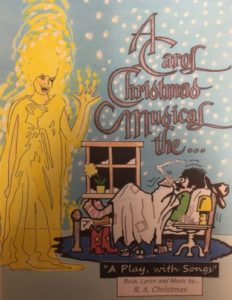 Bob’s most recent literary oeuvre is A Carol Christmas Musical the (that’s not a misprint!), a love song to his late wife, Carol. If nothing else, this experimental musical reveals that Bob Christmas could easily have been at home in Nashville. At home? He could have been a star with songs like “Hot Flashes and Cold Kisses,” “Throwin’ Stones,” “Spending another Sunday with the Blues,” “It’s Over and I’m Gone Under,” and “You Are Everything Called Love.” Like other of Bob’s literary works, A Carol Christmas . . . reveals Bob’s characteristic brilliance in creating interesting characters and keeping an emotional distance with wit and irony. But it also reveals a heart softened by pain and loss and an awareness that although love in a Mormon heart ends up in heaven, it begins on earth.
Bob’s most recent literary oeuvre is A Carol Christmas Musical the (that’s not a misprint!), a love song to his late wife, Carol. If nothing else, this experimental musical reveals that Bob Christmas could easily have been at home in Nashville. At home? He could have been a star with songs like “Hot Flashes and Cold Kisses,” “Throwin’ Stones,” “Spending another Sunday with the Blues,” “It’s Over and I’m Gone Under,” and “You Are Everything Called Love.” Like other of Bob’s literary works, A Carol Christmas . . . reveals Bob’s characteristic brilliance in creating interesting characters and keeping an emotional distance with wit and irony. But it also reveals a heart softened by pain and loss and an awareness that although love in a Mormon heart ends up in heaven, it begins on earth.
In “Birches,” Robert Frost says,
Earth’s the right place for love:
I don’t know where it’s likely to go better.
He imagines getting away from earth for a while by climbing a birch tree
Toward heaven, till the tree could bear no more,
But dipped its top and set me down again.
That would be good both going and coming back.
Robert Christmas’s art is grounded on earth, but in his musical he reveals it can also touch heaven.
Biographical Sketch
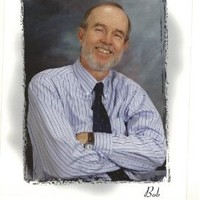 R. A. (Robert Alan) Christmas was born in July 1939 in Pasadena, California. He was converted to The Church of Jesus Christ of Latter-day Saints in 1957 by his high school sweetheart.
R. A. (Robert Alan) Christmas was born in July 1939 in Pasadena, California. He was converted to The Church of Jesus Christ of Latter-day Saints in 1957 by his high school sweetheart.
He is a graduate of Stanford (1961), where he was a student of poet and critic Yvor Winters. He earned his M.A. from the University of California, Berkeley (1963), and a doctorate from the University of Southern California in Medieval English Literature (1968). Christmas taught English and creative writing at Idaho State University, the University of Southern California, San Jose State, Pasadena City College, College of the Desert, and Southern Utah State College, where he served as the English Department Chair. He left teaching in 1973 for a forty-year career in music and business. During the 1970s and 1980s he performed in and around Hollywood as a singer-songwriter and studied songwriting with Al Kasha and Buddy Kaye.
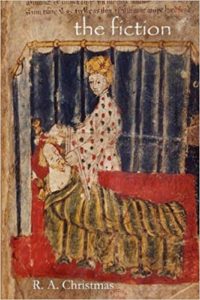 Christmas has contributed dozens of pieces of poetry, fiction, and criticism in Dialogue: A Journal of Mormon Thought, since its first issue in 1966. He has also published in Stories Southwest, The Southern Review, Western Humanities Review, BYU Studies, and Sunstone. His work has been anthologized in Greening Wheat, Harvest, and Tending the Garden (all published by Signature Books). He has published nine books of poetry (Hungry Sunday, Housebroken, Driving on the Lake Bed, A Long Spoon, The Kingdom of God—Or Nothing!, When it Snowed in Pasadena, One Foot in the Grave, Saviors on Mt. Disneyland, and Leaves of Sass), a collection of stories (the fiction), and a songbook from his years as a singer-songwriter (Bawdy & Soul). He has been honored by the Ina Coolbrith Society, and has won Association for Mormon Letters awards in 1981 (short fiction, “Another Angel”) and 1987 (poetry, “Self-Portrait as Brigham Young”), and was an AML award finalist in 2017 (short fiction, “Le Train à Grande Vitesse”). Christmas’ latest creation is A Carol Christmas/ Musical The, A Play, with Songs (2020). All of Christmas’ publications are in print and can be found at www.lulu.com/spotlight/rachristmas.
Christmas has contributed dozens of pieces of poetry, fiction, and criticism in Dialogue: A Journal of Mormon Thought, since its first issue in 1966. He has also published in Stories Southwest, The Southern Review, Western Humanities Review, BYU Studies, and Sunstone. His work has been anthologized in Greening Wheat, Harvest, and Tending the Garden (all published by Signature Books). He has published nine books of poetry (Hungry Sunday, Housebroken, Driving on the Lake Bed, A Long Spoon, The Kingdom of God—Or Nothing!, When it Snowed in Pasadena, One Foot in the Grave, Saviors on Mt. Disneyland, and Leaves of Sass), a collection of stories (the fiction), and a songbook from his years as a singer-songwriter (Bawdy & Soul). He has been honored by the Ina Coolbrith Society, and has won Association for Mormon Letters awards in 1981 (short fiction, “Another Angel”) and 1987 (poetry, “Self-Portrait as Brigham Young”), and was an AML award finalist in 2017 (short fiction, “Le Train à Grande Vitesse”). Christmas’ latest creation is A Carol Christmas/ Musical The, A Play, with Songs (2020). All of Christmas’ publications are in print and can be found at www.lulu.com/spotlight/rachristmas.
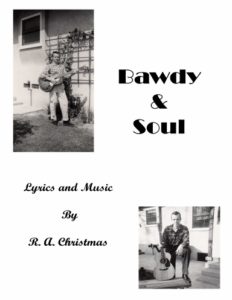 In addition to teaching and writing, Christmas has had a long and varied career as a businessman. He has held sales and management positions with Crown Transfer & Storage, Elco Manufacturing, and ABC Products, in Southern California. He owned and operated a waste-water treatment business in Utah and spent twenty years selling and investing in real estate in the Provo/Salt Lake City area with his late wife and partner, Carol Joyce Dennis.
In addition to teaching and writing, Christmas has had a long and varied career as a businessman. He has held sales and management positions with Crown Transfer & Storage, Elco Manufacturing, and ABC Products, in Southern California. He owned and operated a waste-water treatment business in Utah and spent twenty years selling and investing in real estate in the Provo/Salt Lake City area with his late wife and partner, Carol Joyce Dennis.
Together with his wife, Christmas served three LDS Church senior missions, in Riverside, California, Geneva, Switzerland, and Brussels, Belgium. He is the father of seven children, stepfather of four, and grandfather of thirty-five. He currently lives in southern Utah.

Here are Clifton Jolley’s comments at the event honoring R. A. Christmas.
If Orson F. Whitney had realized that Bob Christmas would be Mormonisms Shakespeare or Milton, he would have corrected his prediction to say, “Never mind literature. We will make less dangerous attorneys and bankers.”
Guy Kawasaki—Apple’s original “Evangelist of Brand”—argues that disruptive innovation does not evolve, it leaps. No icebox manufacturers became refrigerator makers. No buggy builders evolved to manufacture automobiles. Similarly, disruptive creative writers give the reader a sense of the author having sprung from the head of Zeus with pen and paper in hand, less influenced by than associated with other writers of their tribe.
That’s the kind of writer Robert Christmas is revealed to be in his poems, essays, and stories. If his literature is influenced by other Mormon writers, the influence is one with the history of western literature, although his subjects and themes depend on and are deeply and often specifically Mormon. And if the characters and scenes and predicaments of his stories are of a time, they also are outside of time, requiring the reader to come to them rather than spoon-feeding readers a jingoistic gruel for which many now have an appetite.
These are stories that hearken to the Robert Christmas generation of the mid-20th century, including the primeval conflicts of parking, petting, and home-cooked meals. So, there are no iPhones or internet or answering machines; no text messaging or drones (except of the human kind); no pastiche of technology or cultural domination by electrical engineers.
But if these are simpler stories and poems of more fundamental times, they are stories anyone with a Mormon ear will recognize for tone, resonance, and cultural acquaintance. And non-Mormon audiences may find them even exotic, helping the uninitiated to appreciate the drama and trauma not peculiar to Mormon experience, but certainly indicative of it.
There may be some who find the diction of that time (when “dang it” is among the most grievous epithets) and the author’s unblinking eye for vulgar (but familiar) detail jarring. But if the reader is willing to surrender to that time of Gold and Green Balls when MIA was an acronym for the Mutual Improvement Association, there are revelations of self to be discovered here. Not because Robert Christmas is an exemplar of a “Mormon genre” or a pillar of the faith (which he has become), but because he provides a tensile guy-line at once resisting and supporting the cultural center tentpole of Mormonism.
If Gene England was right about personal essay and conversational literature being the Mormon literary art form, Robert Christmas is L’enfant Terrible of that form: his rhetoric occasionally vulgar to the orthodox ear (though by far more discreet than 21st century permissions or even current headlines); his themes spanning from adolescent libido (“The Golden Questions”) to post-dystopian fantasy (“The Kingdom of God—Or Nothing!”); his perceptions more incisive than the “sounding brass or tinkling cymbal” of orthodoxy and proselytizing.
The New Statesman credits the internet with making “writing as innovative as speech,” which makes the rigorously conversational style of Robert Christmas a perfect (if paradoxical) companion to digital publication, just as it has for half-a-century been a paradoxical exemplar of the provocateur believer. So, if a reader can live for a few hours without the encouragement of LOL or the assistance of emojis, Robert’s prose and poems reveal a rhetoric that is muscular but sweet, spontaneous but well-designed, and respectful but not pandering to Mormon faith and foibles while providing images and stories of a complicated devotion seldom found in more popular Mormon writing.
Where else can you find Mormon writing that includes boob, dong, penis, coitus-maladroitus, and pudendum associated with a vocabulary of admiration for the culture it celebrates, its tensiled rope of words a subversive sort of worship that may be creating a new genre—Disruptive Mormon Fiction—with Robert Christmas as a leading Evangelist of the brand.